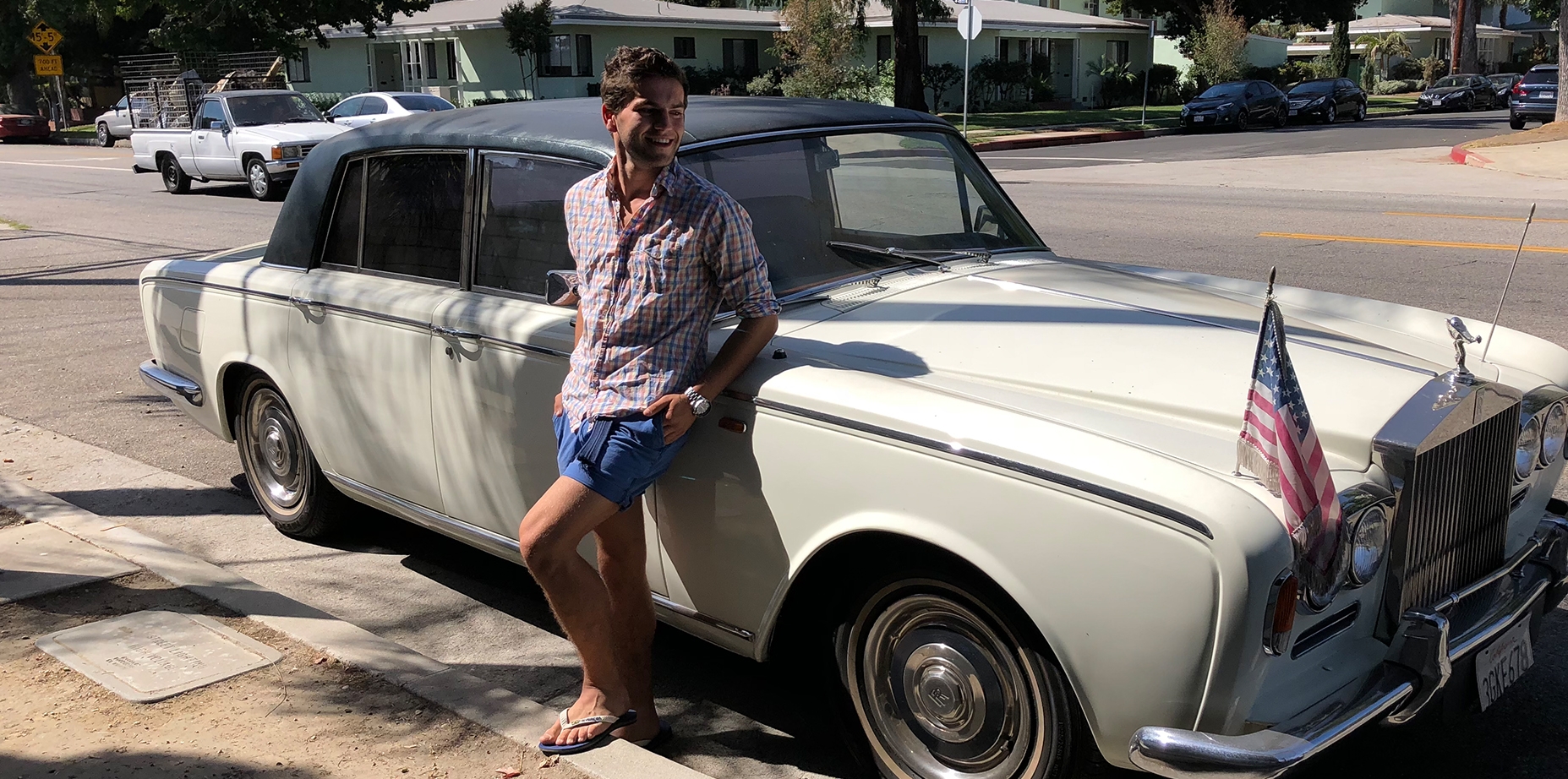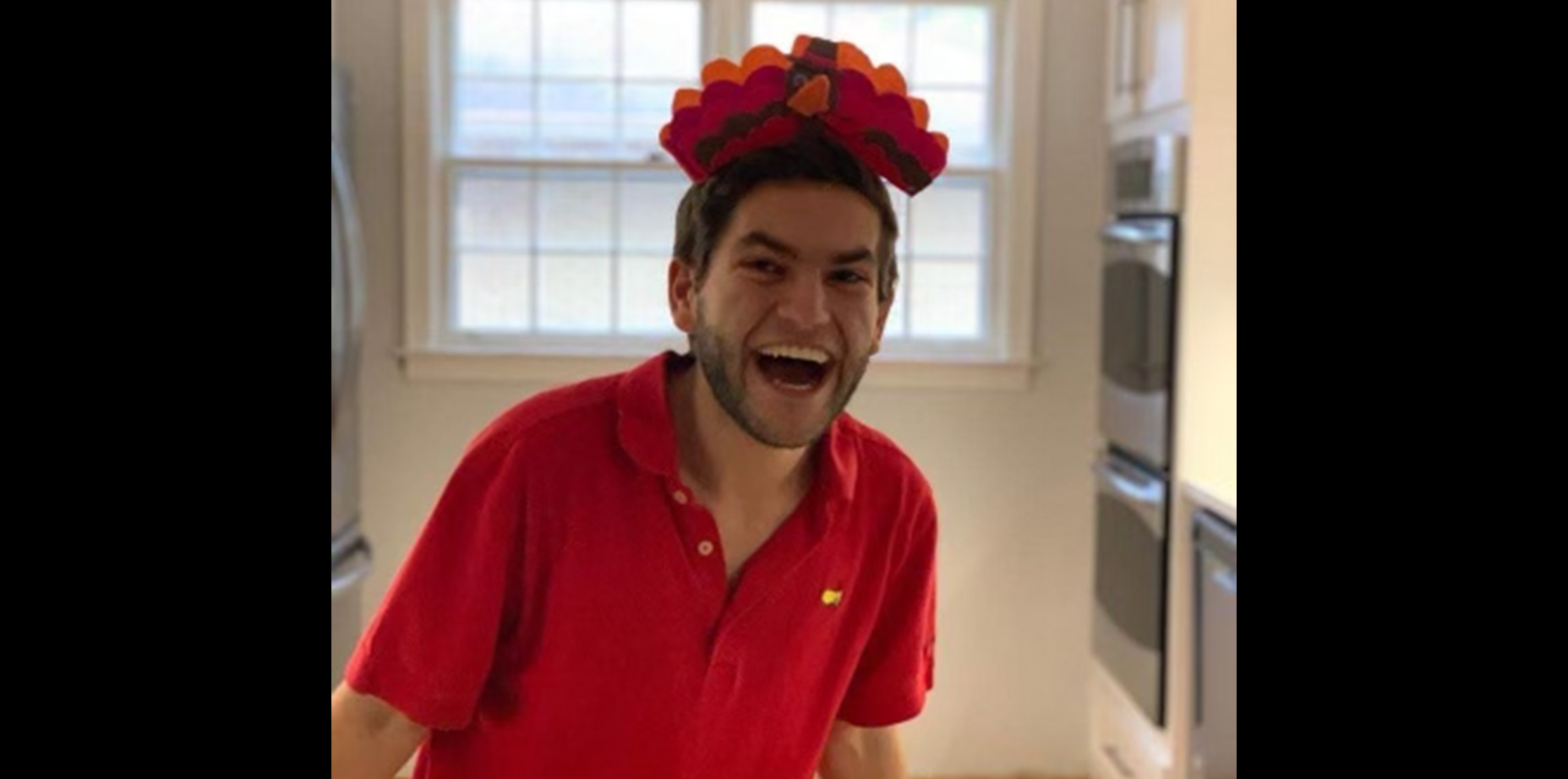Yeshiva University is left in mourning after a beloved gay alum dies by suicide
Herschel Siegel had previously written on Instagram about being gay within the Orthodox community

Herschel Siegal, who was a beloved member of the Jewish community at Yeshiva University and Atlanta, died by suicide on April 28, 2023. (Courtesy)
(New York Jewish Week) — Before eulogizing their friend on Thursday night, Beth Weiss draped a rainbow flag with a Jewish star over the podium.
It was a potent symbol of the twin identities that Weiss and others who knew Herschel Siegel said he had struggled to reconcile, particularly as a student and 2021 graduate of Yeshiva University. Siegel died by suicide Friday in Atlanta, where he grew up and had been living.
Weiss said during the eulogy they recalled having “a conversation with a gay friend about what it felt like to be queer in the Orthodox world” for the first time with Siegel, a classmate at Y.U., the Modern Orthodox flagship in uptown Manhattan.
“I can’t tell you how invaluable conversations and connections like that are,” Weiss said. “We talked about our dreams for the future, but also the reality of how our future might look because of our queerness.”
Weiss’ comments, delivered at a memorial held on the Y.U. campus and organized by some of Siegel’s friends from college, reflect a narrative solidifying around Siegel’s death. Many believe — based on their conversations with Siegel, his social media posts and their own experiences — that Siegel had considered that there may have been no place for him as a gay man in the Orthodox community where he grew up and attended college.
Even as some in Siegel’s community have downplayed the focus on his sexuality following his death, friends say his suicide should be a wakeup call at a time when Yeshiva University is deeply divided over whether and how to include LGBTQ students. In recent years, the school has fought not to have to recognize an LGBTQ student group, even petitioning the Supreme Court for relief. A trans woman was also told she could no longer pray in a synagogue affiliated with the school.
Weiss told the New York Jewish Week that there are many “Orthodox queer people who are possibly suffering, who feel like they are alone, and who feel like they don’t have a future,” adding, “I know that Herschel felt that way at points in his life because he told me.”
Experts caution that it is a mistake to attribute suicides to single causes. Still, there is no question that LGBTQ youth are at increased risk, particularly when they are not accepted in their communities. According to a 2023 survey by the Trevor Project, a nonprofit focused on suicide prevention in the LGBTQ community, 41% of LGBTQ young people seriously considered attempting suicide in the past year.
Siegel made his struggle transparent. In an Instagram post from March that has circulated widely after his death, he wrote about how the word “abomination” in a Torah portion brought up trauma for him as a gay man within the Orthodox community.
“According to that trauma, my very EXISTENCE as a gay, Jewish, Male was an abomination,” Siegal wrote. “And even decades later, that fear-based thought pattern erupted into my consciousness, at the most unexpected of times.”
He then asked, “Do we ever REALLY heal from the deeply traumatic memories within us? Or is it rather a Journey, like many other emotions, and then we come to realize that one day we are at ease while riding ‘the trauma-coaster’?”
Siegel ended the post on a positive note, sharing gratitude for anyone who “has ever experienced a profoundly traumatizing event within your lives. … The fact that we made it this far is something to be proud of in and of itself!”
He died a month later, on the eve of the Shabbat when the weekly Torah portion includes the Jewish legal prohibition on homosexual intercourse, calling it an “abomination.”
“I think about the bravery, the heroism, the strength of this kid,” said Mordechai Levovitz, a therapist and the clinical director of Jewish Queer Youth, an organization that seeks to support and empower Jewish LGBTQ teens, with a focus on the Orthodox community. “I think any person at all willing to endure a community in a religion that is very cruel to him — and yet sees the value because there is also still value — is someone that I think we can look up to, and that we can learn from, and that we can be inspired by.”
He added, “But also, we can admit and witness and bear the fact that it is because of the community that we created that this kid could not find a future for himself and thought that it would perhaps be better off if he was not here, or if he did not exist.”
Not everyone who has commented on Siegel’s death is connecting it with his sexuality. Rabbi Ilan D. Feldman of Beth Jacob Atlanta, Siegel’s synagogue, wrote an email to the congregation saying that “our thoughts and tefillos [prayers] go out to the Siegel family, whose agony can never be fully fathomed, and who will be embraced and supported by us, their community.” Siegel is survived by his parents and four siblings.
Feldman presided over a funeral on Sunday that people who were present said was attended by about 200 people, with more than 450 tuning in on Zoom. Levovitz said that at the funeral, the rabbi referred to Siegel as being “mentally ill.” Mental illness is considered the strongest predictor of suicide.
Feldman told the New York Jewish Week over the phone that “even by reducing this story to a one-dimensional story of a guy who was gay, who committed suicide, we’re actually doing a disservice to gay people.” He also said Siegel’s family is distressed by the narrative, which they believe is untrue.
“The storyline of this particular case is an openly gay person who had wonderful relationships with the entire Orthodox community, including haredi Orthodox leaders,” Feldman said. “And now we’re going take this guy after his death, during his shiva while his family is grieving, and start talking about [how] gays are marginalized and whether this drove him to suicide, when this is the one case where an Orthodox community embraced a gay person with love and with no exceptions.”
But he acknowledged that there is “a big difference between pressures from the Jewish community and pressures from Jewish tradition,” which under Orthodox interpretations does not permit homosexuality.
“If he ever felt pressure, it was relieved by the love that he received in the community, but the pressure may have been there because Jewish tradition is inconsistent with gay activity,” Feldman said.
A source in the Atlanta community who said he had known Siegel since Siegel was a child said Siegel’s death comes on the heels of another suicide in the Atlanta Orthodox community, also of a young person who identified as a member of the LGBTQ community.
“There is a cloud of sadness. People just feel confused and lost. This is the second time in six months,” the source said. “It’s just resonating very hard for people. Young people taking their lives, it’s not supposed to be something that is normal and is regularly happening.”

Chaim Nissel, a dean at Yeshiva University who was an associate provost during Siegel’s tenure as a student, spoke at the Thursday night gathering and said he had known Siegel well, and even had the student visit his home. (Nissel was originally named in the lawsuit by the YU Pride Alliance against the university but was dropped after Y.U. argued that he did not have authority over whether the LGBTQ student club was approved.)
“He struggled to reconcile his identity and love of Torah,” Nissel said. “He died from mental illness.”
Yeshiva University had previously released a statement about Siegel’s death.
“We are deeply saddened by the passing of Herschel Siegel, a member of the Yeshiva University family,” the statement said. “We express our deepest condolences to his family. May his memory be a blessing.”
Siegel’s family did not respond to a request for comment. People close to the family said they were too distraught to speak to the press. The source from Atlanta who knew Siegel since he was a child said the family was “angry for the way that this is being spun,” suggesting that Siegel’s sexuality should not be the only focus.
“I do resent anyone that is trying to make this about him being gay,” the source said. “It’s the chicken or the egg situation. Did being gay in the Orthodox community make his depression more triggering, or was it that he was depressed, and felt alone, which made being gay so much harder?”
Even his closest friends say it’s impossible to untangle those forces.
“Herschel struggled with mental illness and struggled with accepting himself as a gay Orthodox man,” said Emily Ornelas, a friend who was close to Siegel when he was at Y.U.
“That’s a reality,” Orneles said. “Gay people in any organized religion struggle with that. But I do wholeheartedly believe that by the end of his life, he had come to terms with and accepted himself and was able to love himself for who he was in whatever capacity he could. I feel that is true.”
Ornelas says she is choosing to remember the many bright spots in her friend’s life, rather than focus solely on trying to identify reasons for his death. She recalled the way he connected with children when the two staffed a Passover retreat, as well as his energy in his many theater performances at Y.U., the way his smile lit up a room.
“I remember that his hugs were absolutely crushing,” Ornelas said. “I think he could have cracked my ribs easily. I remember that when he smiled, he smiled literally with every single one of his teeth. You could probably count them. I can hear his voice. He has a very particular affect to the way he spoke, and I think it was like a tiny bit of a Southern drawl. He was just like a really big part of my life — and all of our lives — for a very long time.”
At the memorial service, Weiss exhorted others who might feel tormented about being gay in an Orthodox community to hold on, despite their pain.
“You are not alone,” they said, holding back tears. “You have a future, and you have people who love and see you fully. You have people who celebrate all the wonderful, beautiful parts of you. And if it feels like you don’t have those people yet, we are here waiting for you with open hearts.”
They then shifted to a “a message to everyone else here with us tonight” — those who identify as allies, and those who are just deeply sad about their friend’s tragic death.
“Be like Herschel,” Weiss said. “Be like Herschel and embrace and love each of us with enthusiasm and with joy. Be like Herschel and see us as the full, valid and nuanced human beings that we are. Be like Herschel, and support us unconditionally. Be like Herschel so that we can continue to be here even though Herschel can’t. And be like Herschel, so that this never ever happens again.”
If you are in New York City and struggling with suicidal thoughts, you can call 1-888-NYC-WELL for free and confidential crisis counseling. You can also dial the 24/7 National Suicide Prevention hotline at 988 or go to SuicidePreventionLifeline.org.
This article originally appeared on JTA.org.













